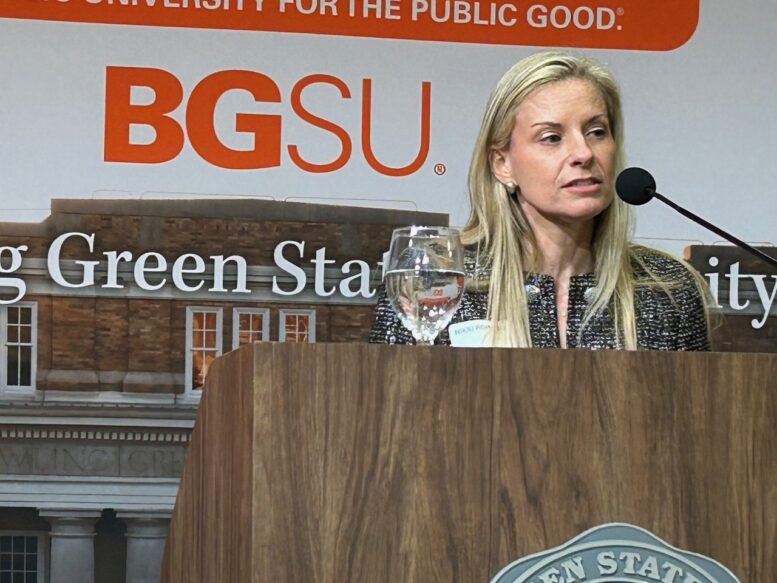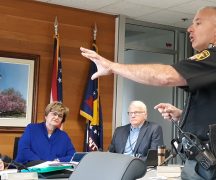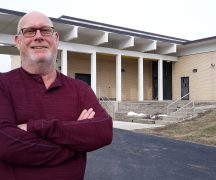By DAVID DUPONT
BG Independent News
Five years after the United States became gripped in the COVID-19 pandemic lock down, Dr. Nikki Romanik, a global health security fellow at Brown University, reflected on the world’s preparedness for the next pandemic.
Romanik, who was a senior White House during the Biden Administration, made it clear — another pandemic is not a matter of “if,” but “when.”
And while she spelled out what was learned during COVID-19 she also lamented a change in political climate that could hinder implementing those lessons.
Romanik was the keynote speaker at the Public and Allied Health Symposium at BGSU earlier this month. Her theme was “One Health, Many Futures: Tackling Infectious Diseases Together.”
[Click to view video of the keynote address]
“History is filled with lessons forgotten, not lessons learned,” she said. When the next pandemic comes … we must be ready and not forget all we have learned the past five years, the good and the bad.”
When COVID-19 emerged, she recalled: “Many people believe that it was nothing more than a bad flu, and others believe that the COVID pandemic was the worst pandemic in history. Neither are particularly accurate in fact, but both show what a divisive world we are now living in.”
And. Romanik continued, divisiveness “makes preparing for pandemics incredibly complicated and difficult.” Trump administration has made deep cuts in the public health workforce and has withdrawn from the World Health Organization. That, she said, “will have massive consequences on our capacity to prepare for and respond to pandemic threats.”
In order to share information and coordinate as in the past will require “193 bilateral meetings per year at minimum.” The next pandemic may not wait for those meetings to occur.
Still, Romanik urged those in attendance not to give up.
She singled out three positive developments that came out of the fight against COVID-19. She likened the pandemic response to building a plane while in flight.
“COVID woke everyone up from the slumber that they had been sleeping for a hundred years,” she said. “Governments, health agencies, organizations like the World Health Organization, prioritized pandemic preparedness. … This needs to continue.”
The second improvement, Romanik cited, was the improved surveillance technologies. An effective early warning system was developed and that’s important when a pandemic emerges.
“And let’s not forget wastewater surveillance — poop,” she said. “Who would’ve thought poop was one of the most important things that we got out of COVID? It’s true. We now have wastewater surveillance not only in America, but we also have it on airplanes that everybody flies, and they don’tt even know it.”
The development of vaccines and drugs to treat the disease are another advancement, Romanik said. That’s continuing as vaccines are developed for avian flu and M-pox. Much of this is coordinated by the Coalition for Epidemic Preparedness Innovations,
“But the goal of all of that work and all that preparation was to be better prepared across a range of pathogens,” Romanik said, “not just the pathogens that are staring us in the our face.”
Other countries, she noted are building their own capacity to develop and manufacture vaccines and drugs so they are not so dependent on the United States.
Romanik said that the public goes through cycles of “panic and neglect” when dealing with pandemics. Now we are in a period of neglect.
“People of sick and tired of hearing about the word ‘pandemic,’ the word ‘COVID,’ the word ‘preparedness,’ the word ‘outbreak,’ she said. “That’s completely and utterly understandable. … It’s been five years, but people still are going to need time to grieve whatever losses they had during COVID.”
But those at work in public health need to continue to prepare for the next pandemic, Romanik said. That includes coordination across borders. “We need to do this because pandemic threats will only increase due to climate migration and globalization.”
The hardest lesson coming out of the pandemic is the need for public trust and to counter misinformation.
“Public health didn’t do a great job communicating,” Romanik said. “We lost our way and didn’t communicate often, honestly, transparently. And when we took a misstep or learned science had changed, we didn’t communicate the moment those facts changed. All of that has now resulted in a lack of trust that took a moment to disappear but will take years to earn back,” she said.
The public health community must engage their communities, she said. That’s what “moves the needle” as she’s seen several times in her career. “It’s probably the reason why I still get very excited every day when I wake up,” she said.
“The current US political climate makes everything I just said really hard,” Romanik noted as she wrapped up her speech. “It makes everything really challenging, but it doesn’t mean that we give up.”
No country can address pandemics alone. They are global in nature and need global solutions. “Global health isn’t a partisan issue,” Romanik said. “The viruses don’t care whether the state is red or blue and the viruses don’t care if they crossed a border from one country to another. Vaccines also don’t care,” Romanik said.
“It is important to engage people and reach people across the political aisle. Don’t be afraid. We have to get back to a place where pandemic preparedness is a bipartisan issue where everyone sees the value of it because in the next big pandemic, this is going to be critical to saving lives.”





